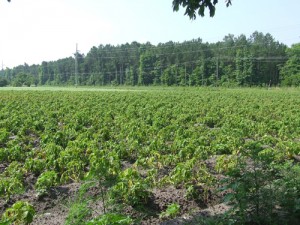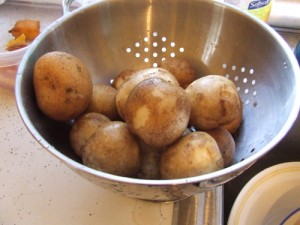by David Cecelski
Tonight my son and daughter baked Irish potatoes in the hot coals left from a fire we built earlier in the day. They wrapped the potatoes in tinfoil and cooked them with fresh onions and a little butter. When they pulled them out of the coals, the tender young potatoes had a nice smoky flavor and were creamy and delicious. We sat out by the fire and ate bowls of them for our supper.
The potatoes came from a farm that used to belong to my great uncle, George Ball, and his brother Raymond. We got them at the local packing shed, which is also on that farm. We have potatoes in our fields, too, but I was glad to have them from the old Ball farm. My mother used to work in their potato packing shed when she was a girl and so did just about everybody else in this little community.
Great-uncle George and Mr. Raymond began potato farming here in 1917. They bought 386 acres of pine and black gum thicket on credit, built a pair of log cabins, and threw up a lean-to to stable their mules. They cleared 15 acres a year and paid off their debt with potatoes, a crop that here in North Carolina has always been concentrated east of US 17, mostly around Pamlico and Albemarle Sound.
From the beginning, the brothers embraced the most modern agricultural practices. They were among the first local farmers to use commercial lime as a fertilizer, rather than relying on wood ash and oyster shells. In 1919, they also bought the county’s first tractor. It was an International Harvester Company, model 10/20. That tractor wasn’t a quiet machine—some folks said “IHC” stood for “In Hell Continuously.”
Eventually, Great-uncle George and Mr. Raymond employed 300-350 people during the harvest. Every morning, local people gathered on their farm to dig, grade, clean, and pack potatoes. They worked hard, but they also told stories and joked and laughed a lot. My mother rode her pony, Goldie, across the canal bridge to get there. Goldie grazed in a field while my mom helped in the packing shed.
The two brothers sometimes hired seasonal workers fromFlorida, too. During the Second World War, they even employed German prisoners of war. My mother always said that the German boys looked real happy to be here.
These days, only a few old timers here remember the Ball brothers and their potato farm. And the harvest isn’t the social occasion it once was: mechanization has reduced the need for labor to a mere handful of men. It’s a different world now, but as we sat by the fire tonight, eating potatoes grown in their fields, these old stories all came back to me.


Leave a Reply